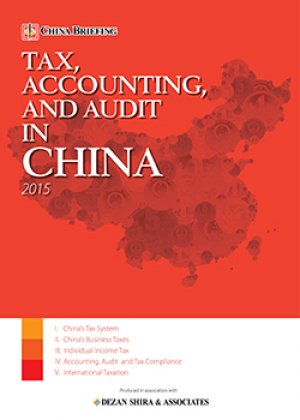Tax Benefits of Changing from an RO to a WFOE
 By Stephen O’Regan
By Stephen O’Regan
International Business Advisory
Dezan Shira & Associates
There are many reasons why setting up a Representative Office (RO) in China is beneficial for a company, with the simplicity and low cost of the registration process being among the most attractive. If a company is beginning its venture into China or only wants a research/support post then an RO is a great way to get started.
There certainly are uses to an RO but at some point in a company’s development, either if it wishes to expand or the expenses are too high, it will mature beyond the scope of the RO and from that point on the RO no longer becomes cost efficient. One must keep in mind how tax on an RO works. ROs are taxed on their expenses which can be quite considerable if companies consider rent, salaries and other variable costs.
ROs in China are highly restricted. They cannot conduct any profit making activities or issue invoices. This has a detrimental effect on the tax of the RO, which results in an effective rate of about 12 percent on expenses. There is no way to change this, the effective tax remains constant, there is no scaling and efficiency in the isolated concept of the RO. Are the tax costs justified by the revenue that is achieved through the RO outside of China? So what options are available to companies?
![]() RELATED: Setting Up a Wholly Foreign-Owned Enterprise
RELATED: Setting Up a Wholly Foreign-Owned Enterprise
One of the most viable options for companies who have an RO already registered is to convert this to a Wholly Foreign Owned Enterprise (WFOE). One of the core differences between the two, is that a WFOE is a separate legal entity under Chinese law, whereas the RO is not. It is merely seen as an extension of the foreign company. The process isn’t exactly a ‘conversion’ as the RO has to be fully de-registered, and the WFOE must be fully established. However, these steps can be completed in any order to offset delays.
Since the effective tax rate on the RO is roughly 12 percent of costs, using the RO to funnel monies to cover operational costs in China can be more expensive than funding operations by means of a WFOE, where a lower effective tax rate can often be achieved. The WFOE can deduct expenses from revenues generated from business activities specified in the business scope ranging from providing services, trading goods to manufacturing products.
The tax savings achieved by using a service agreement between the WFOE and headquarters would be based on the fact of the difference in the deemed profit rate between the two structures. The RO has a relatively inflexible 15 percent deemed profit, whereas the WFOE is taxed at 10 percent of actual profits.
![]() RELATED: Deregistering a Representative Office
RELATED: Deregistering a Representative Office
Of course there would be some expense associated with setting up such a service agreement mechanism, but that could very well be offset and overcome by the tax savings. An actively trading WFOE/FICE would offer even greater flexibility to manage revenue and expenses to minimize corporate income tax (CIT), whereas the RO would continue to be inflexible in that respect.
ROs cannot develop and expand to become more tax efficient and save you capital in the long run. Having a Wholly Foreign Owned Company however will allow companies to have access to many more business opportunities. Further, if the company wishes to expand into trading, the Service WFOE can expand its business scope to include this.
Also, if the WFOE’s services to overseas companies fall under the scope of “logistics auxiliary services” and “general offshore outsourcing services” the company can apply for a VAT tax exemption status, with the latter being from the financial years 2014-2018 which, coupled with the lower tax on profits, could amount to significant savings for a company. Based on Dezan Shira & Associates’ calculations, and assuming varying factors, a company with high yearly expenses through an RO is poised to save a minimum of 12 percent on their tax each year.
Click here calculate the tax benefits your company may receive when converting your RO to a WFOE.
|
Asia Briefing Ltd. is a subsidiary of Dezan Shira & Associates. Dezan Shira is a specialist foreign direct investment practice, providing corporate establishment, business advisory, tax advisory and compliance, accounting, payroll, due diligence and financial review services to multinationals investing in China, Hong Kong, India, Vietnam, Singapore and the rest of ASEAN. For further information, please email china@dezshira.com or visit www.dezshira.com. Stay up to date with the latest business and investment trends in Asia by subscribing to our complimentary update service featuring news, commentary and regulatory insight. |
![]()
 Revisiting the Shanghai Free Trade Zone: A Year of Reforms
Revisiting the Shanghai Free Trade Zone: A Year of Reforms
In this issue of China Briefing, we revisit the Shanghai FTZ and its preferential environment for foreign investment. In the first three articles, we highlight the many changes that have been introduced in the Zone’s first year of operations, including the 2014 Revised Negative List, as well as new measures relating to alternative dispute resolution, cash pooling, and logistics. Lastly, we include a case study of a foreign company successfully utilizing the Shanghai FTZ to access the Outbound Tourism Industry.
 Adapting Your China WFOE to Service China’s Consumers
Adapting Your China WFOE to Service China’s Consumers
In this issue of China Briefing Magazine, we look at the challenges posed to manufacturers amidst China’s rising labor costs and stricter environmental regulations. Manufacturing WFOEs in China should adapt by expanding their business scope to include distribution and determine suitable supply chain solutions. In this regard, we will take a look at the opportunities in China’s domestic consumer market and forecast the sectors that are set to boom in the coming years.
 Tax, Accounting, and Audit in China 2015
Tax, Accounting, and Audit in China 2015
This edition of Tax, Accounting, and Audit in China, updated for 2015, offers a comprehensive overview of the major taxes foreign investors are likely to encounter when establishing or operating a business in China, as well as other tax-relevant obligations. This concise, detailed, yet pragmatic guide is ideal for CFOs, compliance officers and heads of accounting who must navigate the complex tax and accounting landscape in China in order to effectively manage and strategically plan their China operations.
- Previous Article The Strategic Reasons Behind Recent China MNC Closures
- Next Article Comparing China’s Business Costs With Asian Competitors









